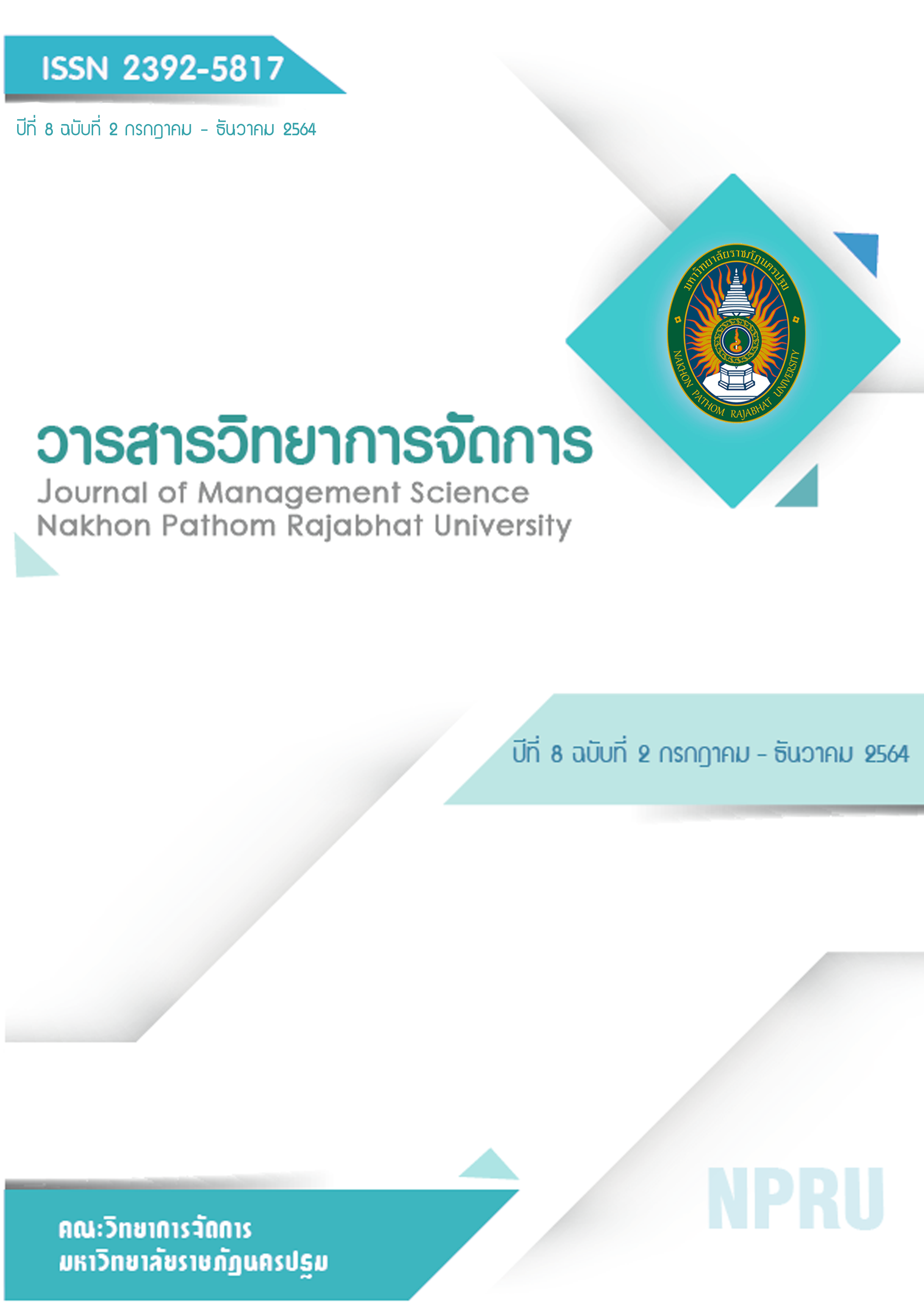The Effects of Customer Satisfaction and Its Effects on The Advocacy of Toyota and Honda Car Users in Bangkok Thailand.
Main Article Content
Abstract
This research aims to study the direct and indirect effects of the expectation factor, perceived quality, perceived value, satisfaction, complaint handling, and loyalty towards advocacy. The samples used in the research were collected from Toyota and Honda car cars. The total sample size consists of 600 individuals, 300 or half of which are Toyota car users and the latter being Honda car users. The statistics used in analyses were in percentages, mean, standard deviation, confirmation element analysis and structural equation modeling.
The results of the study showed that the expectation of car users had a positive impact on their perceived quality and satisfaction; however, there was no positive impact on the perceived value. Furthermore, perceived quality has a positive impact on the perceived value and satisfaction. Perceived value has a positive effect on satisfaction. Additionally, satisfaction has a positive impact on complaint handling and loyalty, although no positive impact on advocacy was found. Complaint handling has a positive impact on loyalty and advocacy. Lastly, loyalty has a positive impact on advocacy. Results from the studies of both Toyota and Honda executives can be applied to create a perceived quality that is consistent with expectations. In order for customers to realize the perceived value, they must be satisfied with the efficiency of complaint handling, which would in turn increase customers’ loyalty, thus promoting advocacy.
Article history : Received 3 March 2021
Revised 14 April 2021
Accepted 26 April 2021
SIMILARITY INDEX = 0.70 %
Article Details

This work is licensed under a Creative Commons Attribution-NonCommercial-NoDerivatives 4.0 International License.
The views and opinions of the article appearing in this journal are those of the author. It is not considered a view and responsibility of the editorial staff.
References
จรรยา ยกยุทธ์ และนลินี ทองประเสริฐ. (2016). ปัจจัยที่มีอิทธิพลต่อกระบวนการตัดสินใจซื้อรถยนต์นั่งส่วนบุคคลขนาดเล็กของผู้บริโภคในเขตจังหวัดอุบลราชธานี. วารสารวิชาการมหาวิทยาลัยราชภัฏอุตรดิตถ์, 11(1), 38-48.
นรีนุช ยุวดีนิเวศ เยาวภา ปฐมศิริกุลและ อมรรัตน์ ศรีวาณัติ. (2562). โมเดลกลยุทธ์การตลาดที่ส่งผลต่อการตัดสินใจซื้อรถยนต์อีโคคาร์ในประเทศไทย. Journal of Economics and Management Strategy, 6 (1), 77-90.
ศูนย์วิจัยธนาคารออมสิน. (2562). อุตสาหกรรมยานยนต์. [ออนไลน์] ค้นเมื่อ 29 ตุลาคม 2562, จากhttps://www.gsbresearch.or.th/gsb/economics/industrial-economics/industry-update/6331/
วรรณา ยงพิศาลภพ. (2562). รายงานแนวโน้มธุรกิจ/อุตสาหกรรม ปี 2563-65: อุตสาหกรรมชิ้นส่วนยานยนต์. กรุงเทพมหานคร: สำนักพิมพ์วิจัยกรุงศรี.
วรรณา ยงพิศาลภพ.(2563). แนวโน้มธุรกิจ/อุตสาหกรรม ปี 2563-2565: อุตสาหกรรมรถยนต์.กรุงเทพมหานคร: สำนักพิมพ์วิจัยกรุงศรี.
Aaker, D. A. (1991). Managing Brand Equity: Capitalizing on the Value of a Brand Name. Free Press, New York.
Amineh, H., and Kosach, N. (2016). Assessment of consumers’ satisfaction with the auto motive product quality. International Journal of Environmental and Science Education, 11(16), 8726-8739.
Automotive Industrial Portal Marklines. (2019). Thailand - Flash report, Salesvolume, 2019. Retrieved January 24, 2020, from https://www.marklines.com/en/statistics/
flash_sales/salesfig_thailand_2019
Carvajal, S. A., Ruzzi, A. L., Nogales, A. F., Valentín, and Moreno, M. (2011). The impact of personalization and complaint handling on customer loyalty. African Journal of Business Management, 5 (34), 13187-13196.
Casey Reader. (2010).The customer loyalty theory market research. Retrieved September 26, 2017, from https://bizfluent.com/info-7746359-characteristics-tqm.html
Comrey, A. L., and Lee, H. B. (1992). A first course in factor analysis. (2nd ed.). Mahwah, NJ: Lawrence Erlbaum Associates.
Dua, K., and Savita. (2013). A study of customer satisfaction with reference to TATA motor passenger vehicles. International Journal of Advanced Research in Management and Social Sciences, 2 (4), 68-83.
Gleim, L., and Robinson. (2015). When perception isn’t reality: An examination of consumer perceptions of innovation. Marketing Management Journal, 25(1), 16-26.
Kaplan, M. D. (2009). The relationship between perceived innovativeness and emotional product responses: A brand oriented approach. Innovative Marketing, 5 (1), 39-47.
Lawer. C., and Knox, S. (2006). Customer advocacy and brand development. Journal of Product and Brand Management, 15 (2), 121-129.
Moosa, M. Y., and Hassan, Z. (2015). Customer perceived values associated with automobile and brand loyalty. International Journal of Accounting and Business Management, 3(1), 92-107.
Mostaghimi, M., Akhlagh, E. M., and Danesh, S. H. S. (2016). An investigation of the effects of customer’s expectations and perceived quality on customer’s loyalty with the mediating role of the perceived value and customer’s satisfaction. Journal of History Culture and Art Research, 5(4), 593-606.
Nikhashemia, S. R., Paim, L., Osmanc, S., and Sidin, S. (2014). The significant role of customer brand identification towards brand loyalty development: An empirical study among Malaysian hypermarkets customer. Procedia-Social and Behavioral Sciences, 207, 182-188.
Othman, M., Kamarohim, N. A., and Nizam, F. M. (2017). Brand credibility, perceived quality and perceived value: A study of customer satisfaction. International Journal of Economics and Management, 11(S3), 763-775.
Pisnik, A., Boris, K., and Zabkar, S. V. (2004). Measurement of perceived quality, perceived value, image, and satisfaction interrelations of hotel services: comparison of tourists from Slovenia and Italy. Journal for General Social, 20(3/113), 602-624.
Somphol Vantamay. (2008). Understanding of perceived product quality: Reviews and recommendations. Journal of Marketing Research, 28(3), 1-8.
Supriaddin, N., Palilati, A., Bua, H., Patwayati, and Jusuf, H. (2015). The effect of complaint handling towards customers satisfaction, trust and loyalty to bank Rakyat Indonesia (Bri) southeast Sulawesi. The International Journal of Engineering and Science (IJES), 4 (6), 1-10.
Susanta, Alhabsji, T., Idrus, M. S., and Nimran, U. (2013). The effect of relationship quality on customer advocacy: The mediating role of loyalty. IOSR Journal of Business and Management, 10(4), 41-52.
Veloso, C. M., Magueta, D. M., Fernandes, P. O., and Ribeiro, H. (2017, September). The effects of customer satisfaction, service quality and perceived value on behavioral intensions in retail industry. Paper presented at the 23th International Scientific Conference on Economic and Social Development, Madrid, Spain.
Walter, A. B., and Horsfall, H. (2017). Perceived satisfaction with organizational response to complaints and repeat purchase intention. IIARD International Journal of Economics and Business Management, 3(6), 11-24.
Wantara, P., and Tambrin, M. (2019). The effect of price and product quality towards customer satisfaction and customer loyalty on Madura Batik. International Tourism and Hospitality Journal, 2(1), 1-9.
WHA Industrial Development. (2019). Electric vehicle. Retrieved December 23, 2020, from https://www.wha-industrialestate.com/en/media-activities/articles/3869/electric-vehicle
Zaw, A. T., and Sirion Chaipoopirutana. (2014). Factors affecting customer loyalty of Toyota cars’ owners in Yangon, Myanmar. Paper presented at International Conference on Business, Law and Corporate Social Responsibility (ICBLCSR’14) Oct 1-2, Phuket, Thailand.


